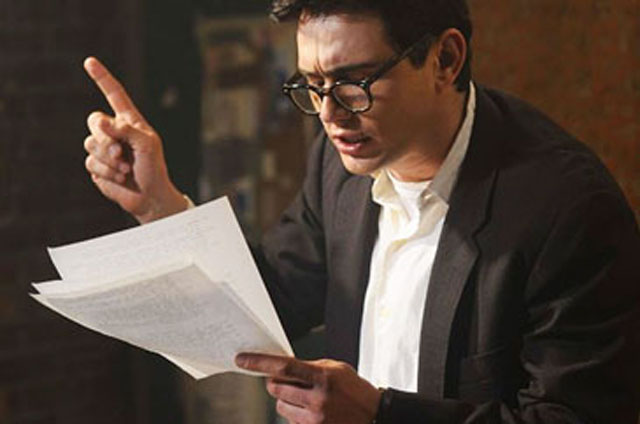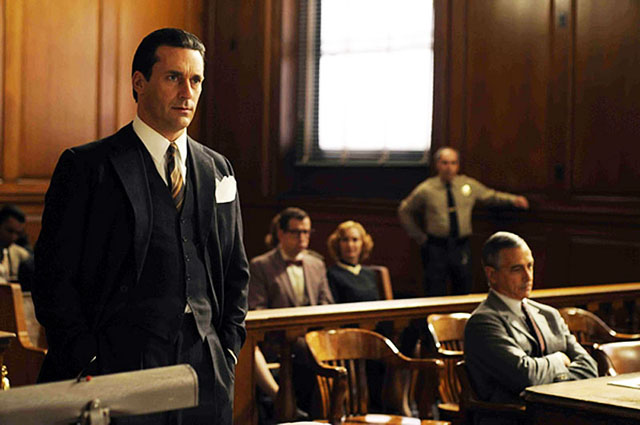CHICAGO – In anticipation of the scariest week of the year, HollywoodChicago.com launches its 2024 Movie Gifts series, which will suggest DVDs and collections for holiday giving.
James Franco as Allen Ginsberg Unleashes a Primal Scream in ‘Howl’
 Rating: 4.5/5.0 |
CHICAGO – “I saw the best minds of my generation destroyed by madness, starving hysterical naked…” So began the reading of Allen Ginsberg’s poem that rattled society, the very title of which is the inspiration for the new film, “Howl,” featuring James Franco, Jon Hamm and Mary Louise-Parker.
The poem Howl is a primal scream, an attempt to wake up a moribund post-WW2 America to the sins of its conquering ways. It is a shot across the bow of the capitalist USA, both prescient and in the moment, a lightning bolt of truth and savagery, the waterfall of words that both cleanses and freezes the soul. The film offers a reading of the piece, illustrated by interpretive animation, and an obscenity trial, focusing on the dirty words in the poem without calculating the rest of the passages, in a 1950s society fearing recognition.
On October 7th, 1955, Allen Ginsberg (James Franco) stood up at the Six Gallery in San Francisco and read in full his poem “Howl.” Like the seed of a flower that defied the social soil that wanted to bury it, the poem blossomed into a full revolutionary credo for the emerging “Beat” society, which included Ginsberg’s friends Jack Kerouac, Neal Cassady and William S. Burroughs. It subsequently reverberated into the culture and madness of the 1960s, and has remained present ever since.
In 1950s San Francisco, Lawrence Ferlinghetti (Andrew Rogers), was the first to publish the poem out of his famous City Lights Bookstore. The reaction took a while to filter into the establishment, but when it got there it was immediately deemed obscene, for its stark depiction of sexuality, language and theme. Ferlinghetti was put on trial for selling the book, defended by attorney Jake Ehrlich (Jon Hamm).
 Photo Credit: © Oscilloscope Pictures |
The 1957 trial was a bellwether for the determination of free speech as the puritan American society began to loosen its grip. Prosecutor Ralph McIntosh (David Strathairn) chose to lessen the poem’s impact by focusing on prurient passages and swear words, but as expert witnesses began to break it down (played by Treat Williams, Mary-Louise Parker and Jeff Daniels), Judge Clayton Horn (Bob Balaban) ultimately made a decision that established a precedent for years to come.
James Franco is marvelous as the revolutionary Allen Ginsberg. He projects the sheer youth and energy of the moment in his reading at the Six Gallery. There was something electrifying about the anticipation of the famous first words, before he even says them. Ginsberg never participated in the trial, so the filmmakers chose to recreate an interview around the time of the events, and Franco again masterfully communicates the emerging and now bearded artist, still brimming with youth but also wise to how the world has chose to embrace his poetic manifesto.
As Franco channeling Ginsberg narrates the poem, the interpretive animation – designed by Eric Dooker – is a memorable kaleidoscope of direct and merging symbols tumbling with the words, enhancing without distracting from them. Anyone who has burned this particular treatise into their subconscious will find every word coming back, like an old friend, to both stir up and soothe the soul. Real truth will do that every time.
The recreation of the reading and trial occupy different territory in the film’s overall consciousness. Writer/directors Rob Epstein and Jeffrey Friedman, straying from their usual documentary work, create a flight of fancy for the Six Gallery reading, allowing the Beats (Kerouac and Cassady) to be part of the audience, and switching from newsreel-style black & white footage to stark and almost garish colors, in subtext to keep up with the animation.
The trial scenes, in contrast, have a brownish faded color, reminiscent of the Douglas Sirk (”All That Heaven Allows”) soap opera films of the 1950s. The Mad Man himself, Jon Hamm, conducts the orchestra of the trial as a stoic block of granite, part Don Draper and a Statue of Justice, tipping the scales just right. The familiar character actors playing the judge and witnesses are all highlights, especially Jeff Daniels as a perplexed poetry professor, knowing what he is saying will eventually haunt him.
 Photo Credit: © Oscilloscope Pictures |
Of course this film serves as is a warning to present-day America, about the power of words and their ability to allow a person to think freely and be effected by the transfer of communicative thoughts that have been carved onto the soft tablets of one energy to another. In a sense we are back in the 1950s, struggling to identify who we are as a nation, a collective, an influencer of the universe.
And what of our hero, the humble Mr. Ginsberg, able to play out several lifetimes until his death in 1997 at the ripe old age of 70? What would he have thought of the post 9/11 uncertainty? “I saw the best minds of my generation destroyed by madness, starving hysterical naked…”
 | By PATRICK McDONALD |


